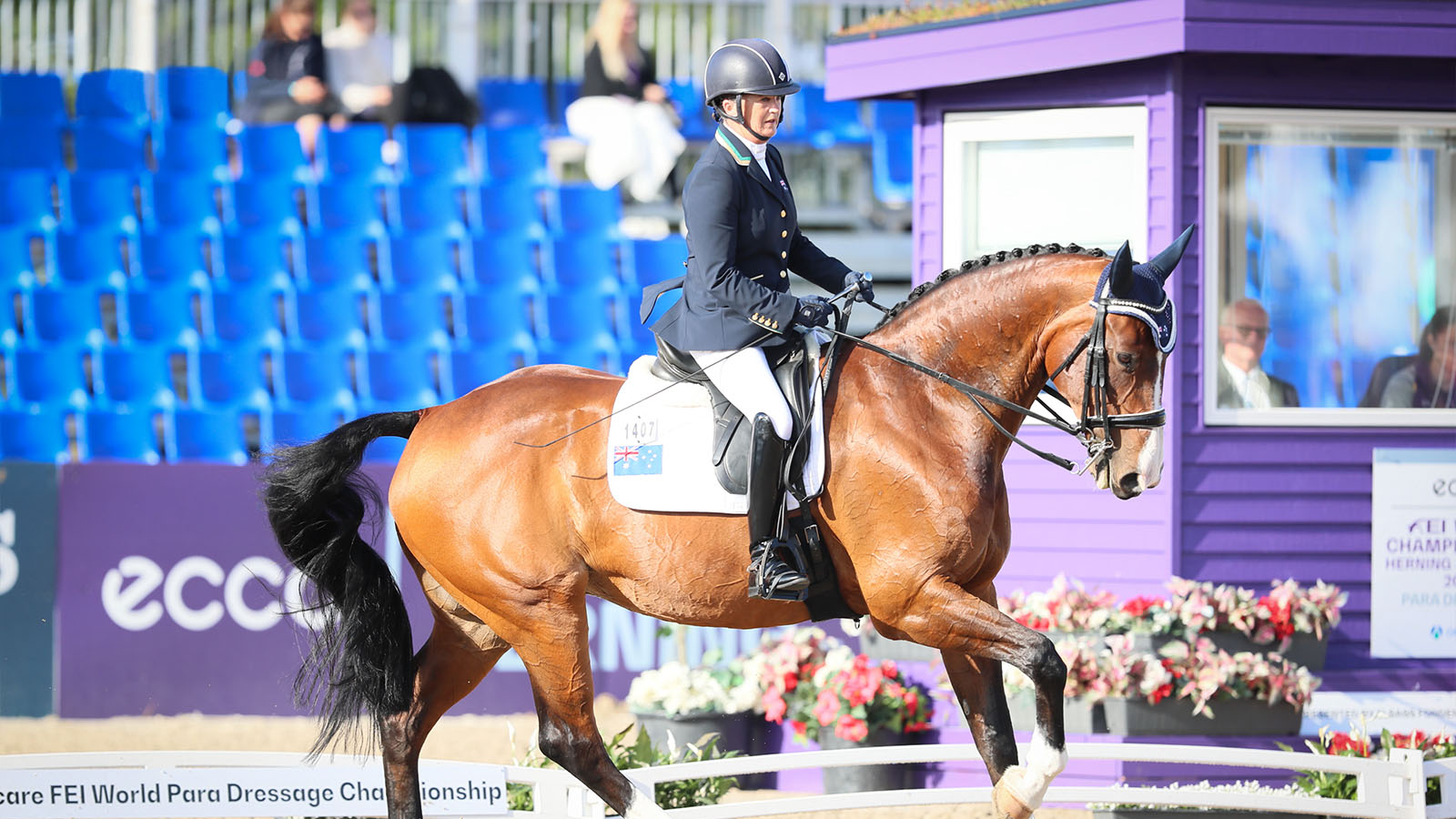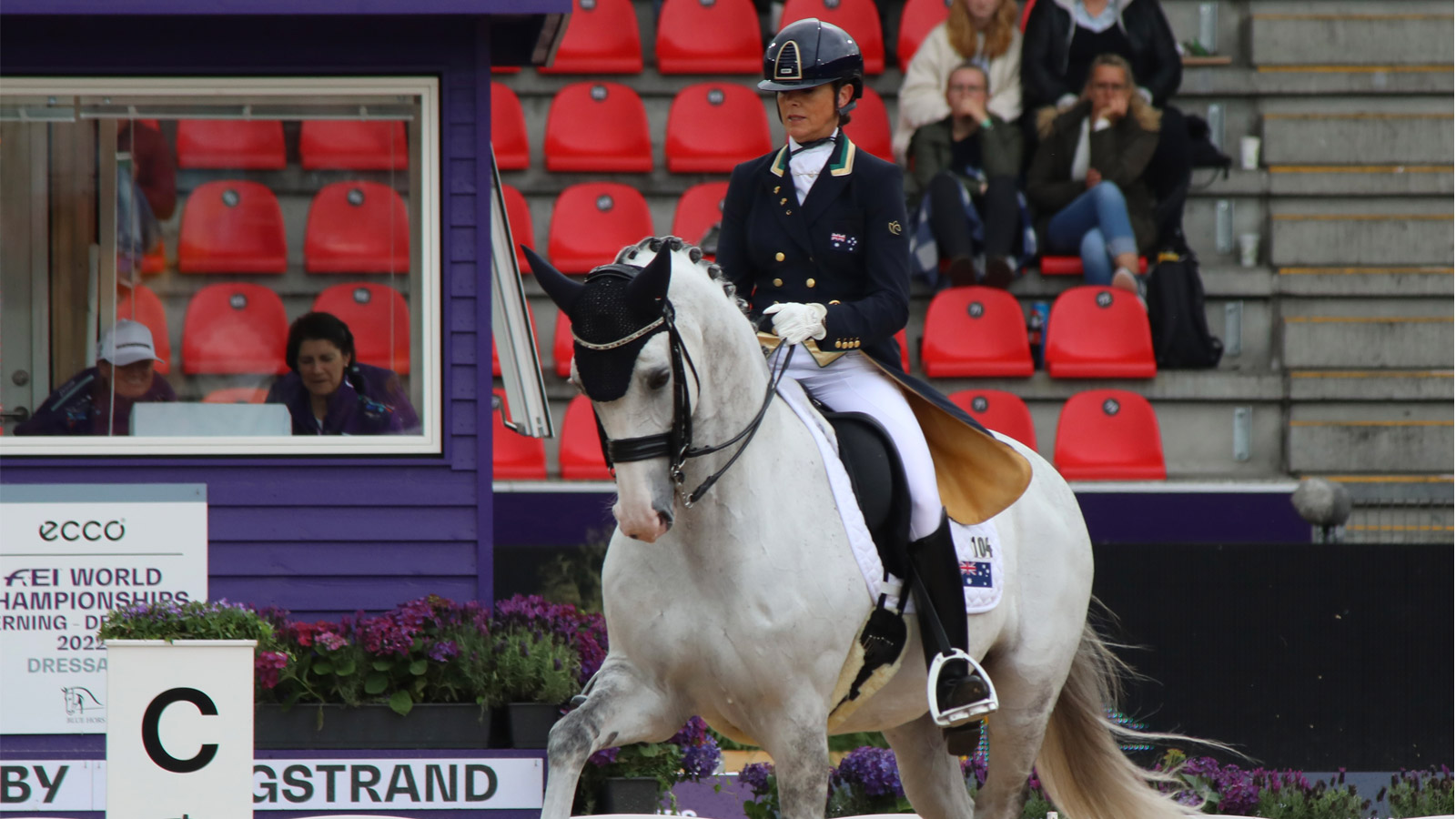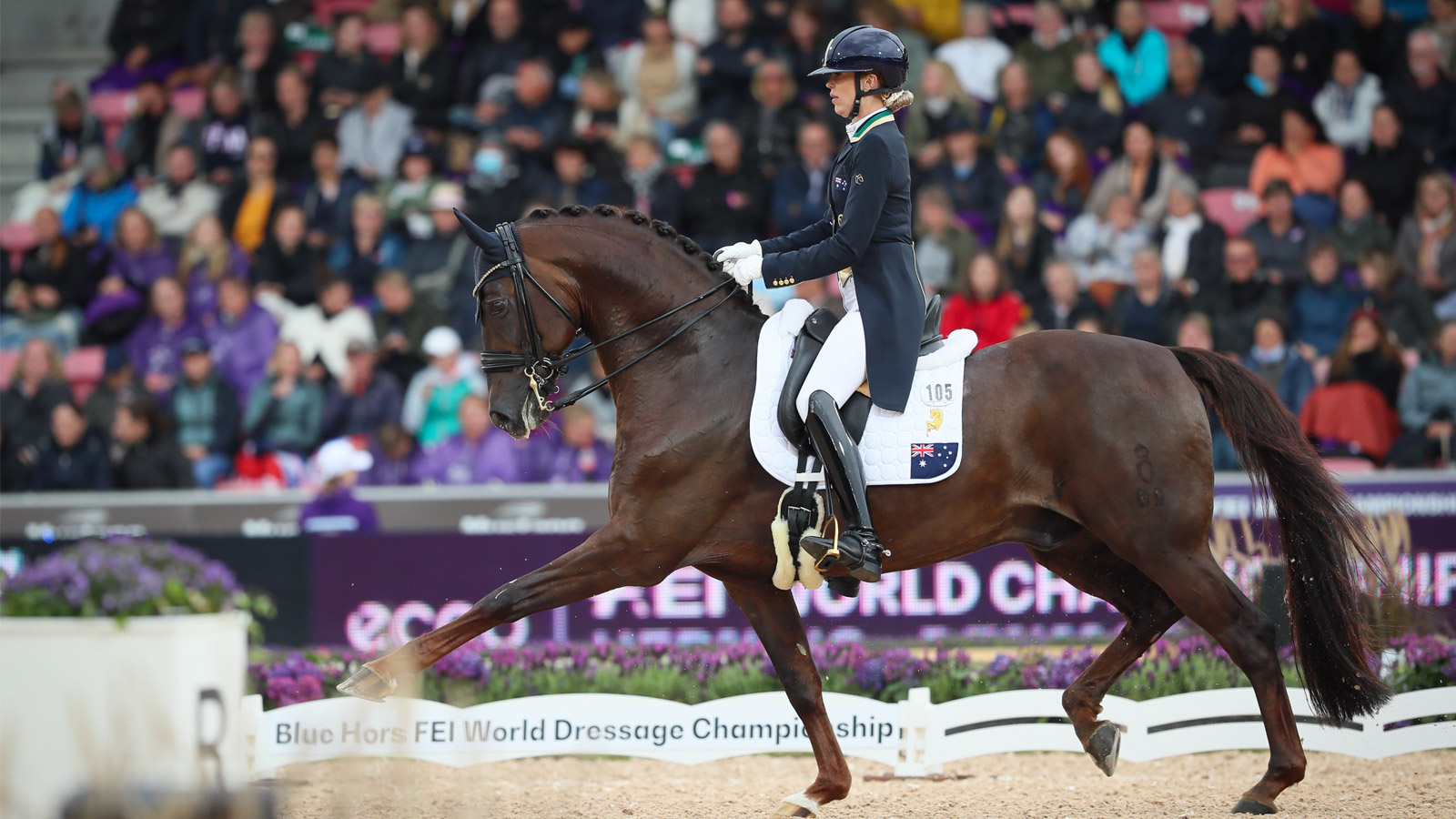Why is sport so important to us? What drives us to compete, whether at the elite level, in our local community or just against ourselves? The answers go to the meaning of life – inspiration, aspiration and motivation.
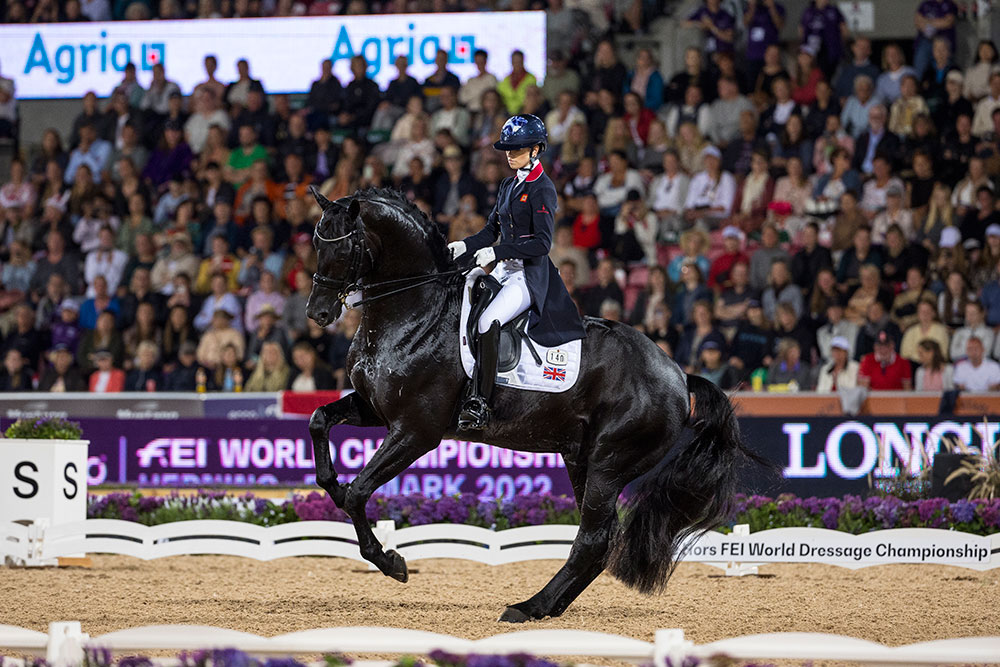
Lottie Fry and Glamourdale inspired many at the FEI World Championships in Herning. © FEI/Leanjo de Koste.
What a feast of sport we watched last month. The top performances at the FEI World Championships in Herning were breathtaking. The stunning Glamourdale and 26-year-old Lottie Fry, his long-term partner, became the new World Dressage Champions with an unsurpassed display of power and elegance, relaxed in that stadium of 14,000 enthusiasts who showed their appreciation in a very rowdy way.
The power and athleticism of the top showjumpers, ridden with such precision, was so exciting to watch. The wonderful King Edward won with a near perfect performance over the whole event. These combinations are the gladiators of our time.
The Commonwealth Games were also a triumph. Australia won the medal tally ahead of countries with way bigger populations. Of course, Australians are keen sportsmen and women and our government funds sports much more generously than most other countries. The budget for high-performance sport coming up to the Paris Olympics and Paralympics is over $136 million. Equestrian Australia receives annual funding of $2.95 million for high performance from the Australian Institute of Sport (AIS) for able-bodied eventing and $695,000 a year for para equestrian dressage. Showjumping and dressage are not funded from the AIS as they are not considered to be medal prospects at the Paris Olympics. But a relatively small number of athletes will be on the path to the Olympics. For example, there are a total 41 athletes listed on Equestrian Australia’s High Performance squads.
Most sport in Australia is community sport, filled with people who want to play sport of some sort but have no aspiration to high performance. Community sport is funded to the tune of $17.6 million per year, according to SportAus, the funding agency established by the Australian Sports Commission. This is a lot of money.
Why is sport important? What is the purpose of sport?
The elite sportspeople are the heroes of our age. They provide entertainment. An estimated 4.7 million Americans watched the World Equestrian Games on NBC at the Tryon Equestrian Centre in North Carolina in 2018, while the estimated global audience was 4.5 billion in 65 countries.
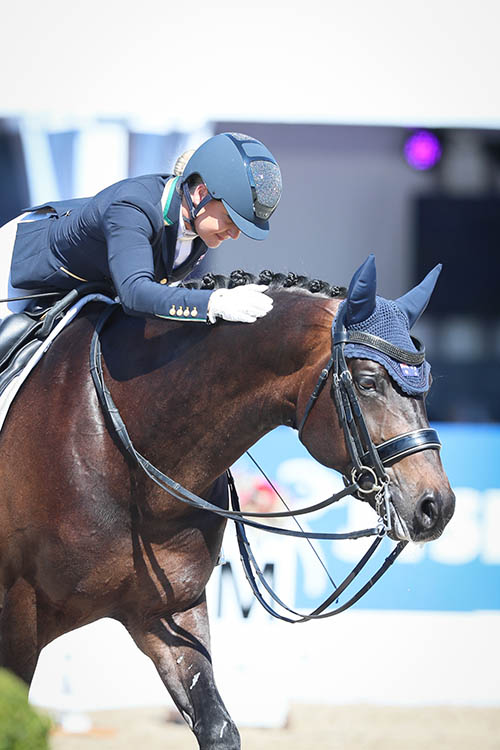
Para dressage combination Emma Booth and Furst Deluxe representing Australia at the FEI World Championships. © Michelle Terlato Photography.
But our elite gladiators provide more than entertainment. They provide inspiration for us to set our own goals and improve our performances. They give us motivation and something to aspire to. They provide an example for aspiration. The Australian Department of Health states that “elite and high-performance athletes showcase the highest levels of skills, mastery and competitiveness. They inspire the community to get active, which creates a base for developing high-performance sport, builds commitment to a lifelong appreciation of sport, (and) provides the benefits of being healthy and active.” Participation in sport, though, gives us much more than physical skills and physical fitness. It is interesting that it is the Department of Health that defines the role of sport on our community.
Sport brings a sense of meaning and purpose to our lives. This is really important. We set goals, persist through adversity, learn to take risks, and learn to win with grace to our fellow competitors – just as we learn to lose with grace. We can participate in equestrian sport without competing but still setting ourselves goals. We learn to think strategically, we practise a positive attitude and have things to look forwards to (hope). We “play” sport and we know that “play” is good for our brains and our wellbeing. Participation in sport motivates us to strive to improve.
Equestrian sport builds our sense of community, our sense of connection with each other, in an inclusive way through the participation of a very diverse group of equestrian enthusiasts – and it gives us that important connection to another sentient being, our horse. So there are physical and mental health benefits from equestrian sports, as well as community benefits.
Nowhere is the connection between elite sport and community sport greater than in para dressage. The importance of the elite sport to provide inspiration and a path to aspire to, bringing renewed sense of meaning, cannot be underestimated.
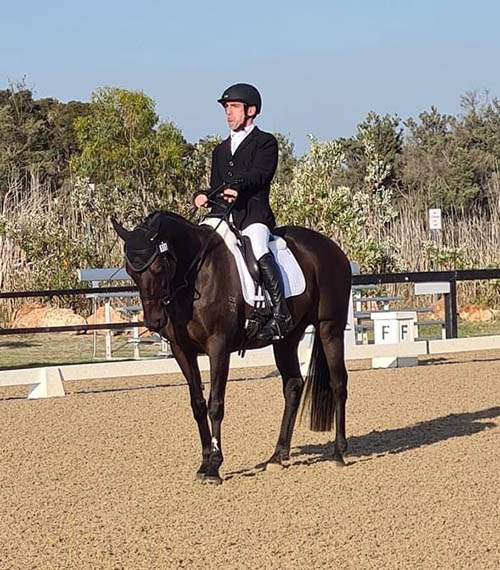
Luke riding Robbie, an OTT by Octagonal. Image supplied.
LUKE’S STORY
Luke Eaton is an aspiring Paralympian. Luke has severe cerebral palsy resulting in profound increased muscle tension affecting his mobility and speech. He is classified as a Grade 1 para rider, the most disabled group who do a test all at walk, judged on rhythm, quality of the walk, suppleness and accuracy. Luke started riding as a three-year-old in a therapy program, and now his whole family are involved. Luke is working towards the Paris Olympics. He has a wonderful relationship with his horse, Robbie, an OTT by Octagonal, who means the world to Luke. His riding gives him a purpose, a sense of achievement and pride in his accomplishments. Luke has made good friends and feels part of the para community. He has been unwell recently, and being part of this community and having hope for the future of his riding really helped him get through a difficult time. He was devastated when the initial decision was made to not send an Australian para team to Herning. It seemed like there was no point to all the dedicated work – not even the qualified riders were allowed to compete on the world stage.

Kelly Ffrost, age six, competing in the show ring. Image supplied.
KELLY FFROST
Kelly Ffrost also started riding as a three-year-old, but was born into a family dedicated to Paint horses. She grew up a show brat, riding western. She had a serious injury in a car accident at 15, but it was not until Christmas Eve when she was 30 that she had an aneurysm (a problem with an artery in her back) which was due to the car accident and resulted in T10 paraplegia. “I was really down and out,” Kelly says. “At first I was so focused on trying to walk, but I was just not going to succeed at that. When I found EPA (Equine Pathways Australia) it all changed. Now I have short-term goals – building core strength, for example – and long-term goals, such as representing Australia in the Grade 3 at the Paris Olympics.”
Kelly didn’t manage to get the scores to qualify for Herning, but she is working on the next goal. “I am really busy, I have a sense of purpose and have something that I can succeed at, it gives me confidence. I have made friends, I am part of a great community. My whole family is in it with me.” Kelly has four children who all help as well. “It has been great for my mental health too. I can hope for the best, but can take the good with the bad.”
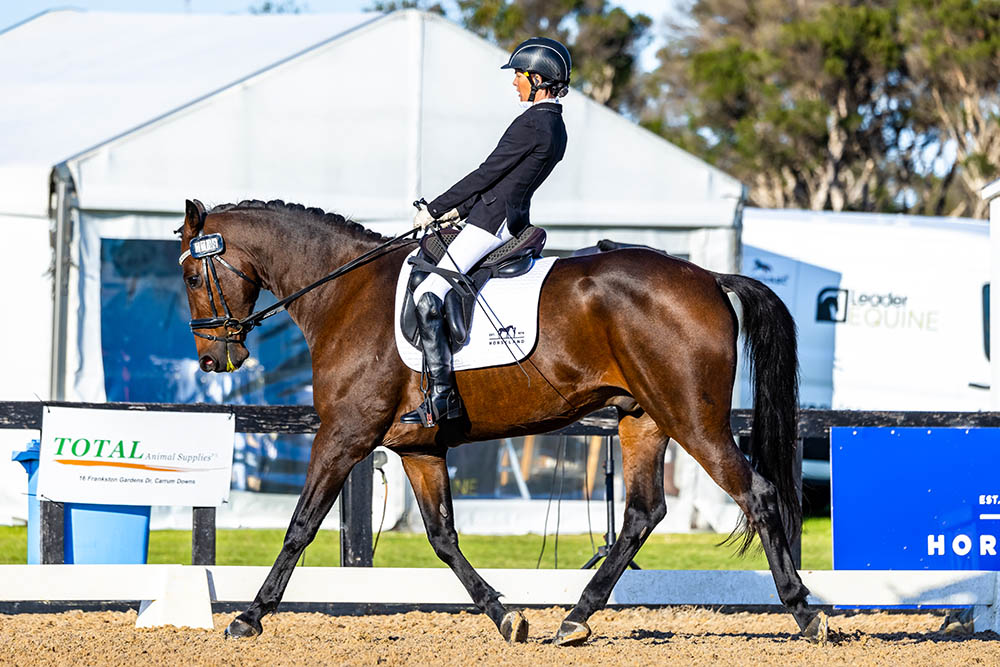
Kelly and Highfield Luda Dijon in the para dressage arena. © One Eyed Frog Photography
MELANIE DIPLOCK
Melanie Diplock is another lifelong horsewoman. She suffered a fall in 2009 resulting in spinal compression and a consequent right-sided weakness. She is a Grade 5 para rider, another EPA participant. “I lost everything with the accident – my business, my independence, the farm – it felt like my whole life was gone. I was told I would never ride again,” says Melanie. “It took four years. The first time I rode again I just cried like a baby. I am lucky because horses have always been in my life, we are in the racing industry. But now I have a purpose, I can aspire to improve. My goals are different now than they were before my accident. Maybe they are bigger goals, I want to go all the way. But I realise it’s also the journey, it’s my mental health, it’s being part of this incredible, amazing, supportive para community.”
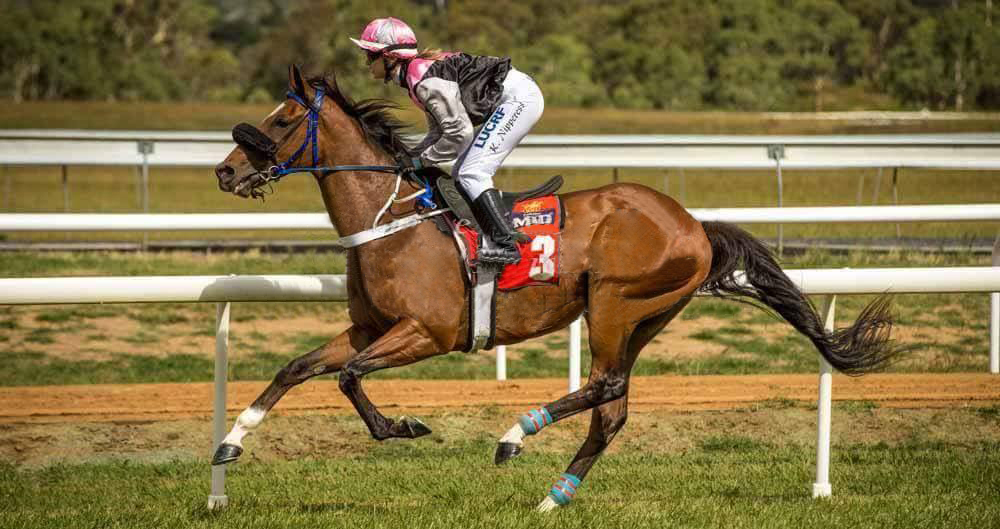
Kate Nipperess was an apprentice jockey with 10 years of experience in horse racing. Image supplied.
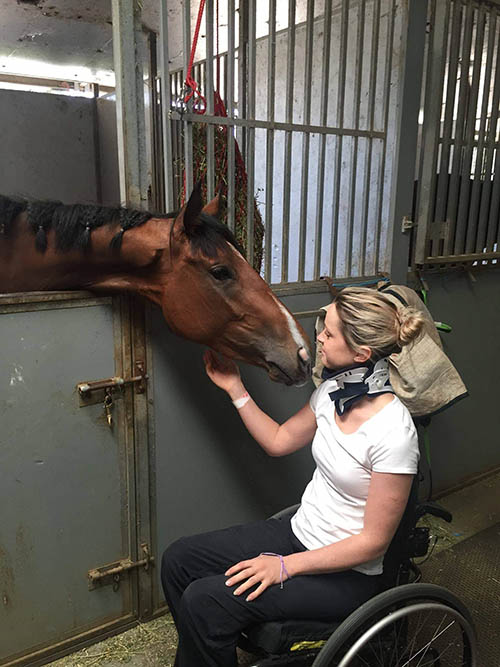
Kate suffered a spinal injury as a results of an accident. Image supplied.
KATE NIPPERESS
Kate Nipperess was an apprentice jockey with 10 years of experience in horse racing and a lifetime of horse riding. “I loved the sport of racing, the adrenaline, the speed,” says Kate. Then it came crashing down in July 2016, with a head-on collision on the track resulting in fractures in her neck (C7) and back (T10), fractured ribs, a fractured shoulder and a head injury. Kate was in hospital for nine months. “Of course, I was told I couldn’t ride. I lost my purpose in life, I lost my identity, I was all about horses all my life. I was at rock bottom and couldn’t see a way up for quite a while. I cared more about riding than walking, but I thought walking was the key to riding so I was really focused on walking. But that didn’t work.
“I did try to ride but it didn’t really work out without knowing about the right adaptive equipment. I didn’t think I could do anything with the riding. Then this year it changed. I work for a foundation founded by an injured jockey. They wanted to support EPA, so I went up there and my whole life changed. I met Julia Battams and told her what I had done. She told me my injury was no barrier. She put the goal of Paris as a possibility in my mind – it was one of the best days of my life. I have found a wonderful community of positive people.”

Kate suffered a spinal injury as a results of an accident. Image supplied.
With the support of Racing NSW and the National Jockeys Association, Kate is looking for a suitable horse for her to compete at Grade 3. “Being around other people who share the passion for horses and also have had their lives turned upside down has been life changing,” says Kate. “Now I can see the injury as not a bad thing, just my journey. I have met amazing people and live a more purposeful life.”
Kate works as a peer support worker for people who have spinal injuries. “A para rugby player told me, ‘You have no control over the injury, but you have control over what you do now’. That changed my perspective too. I am just so happy to be on a horse,” says Kate.
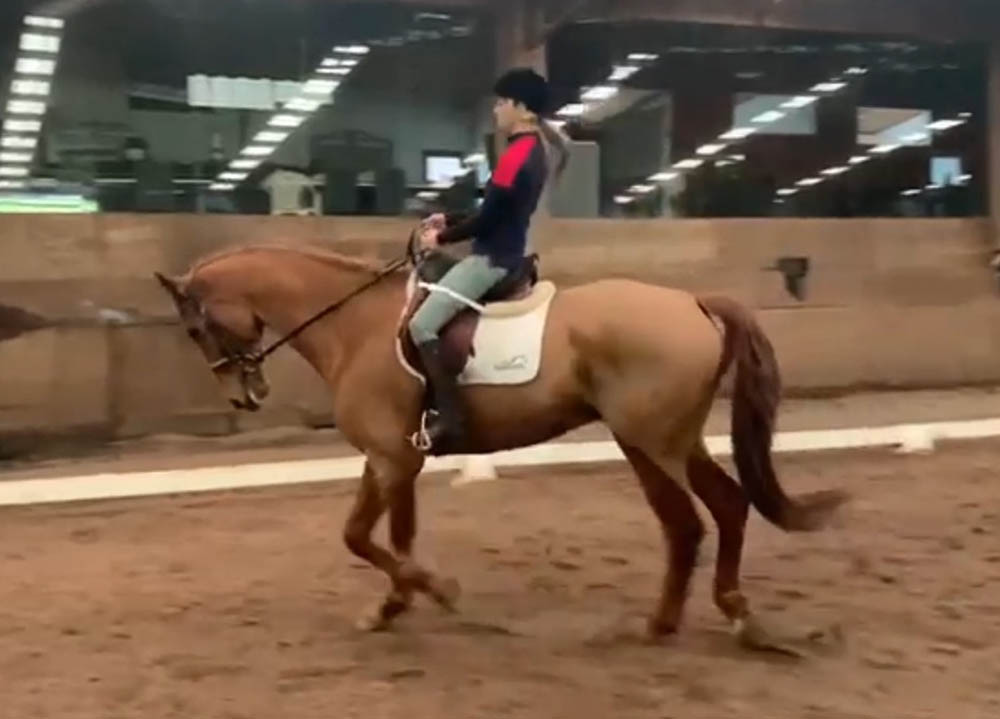
Kate is now back in the saddle post-accident and looking for a suitable horse to compete on. Image supplied.
So, the experts say that participation in sport is good for our physical and mental health and builds community. Horse riding brings meaning to our lives. The vast majority of us won’t compete at an elite level. But the gladiators in the big arenas inspire us. They motivate us. They show us a path that we might aspire to. The elite sport is connected to community sport. It is not just about the medals and glory they may or may not achieve. It is about their place in our whole community. This is one of the things EA overlooked in their initial misplaced decision to not send a para team to Herning. Thankfully reason prevailed. EQ
YOU MIGHT ALSO LIKE TO READ BY KERRY MACK:
Getting on the Bit – Equestrian Life, July 2022
Positive Training Really Clicks with Horses – Equestrian Life, June 2022
Learn From Your Mistakes – Equestrian Life, March 2022 issue
Young Horse Classes: A Fun Launching Pad – Equestrian Life, February 2022 issue
Making Sense of all the Bits & Pieces – Equestrian Life, January 2022 issue
The Secret to ‘Soft Hands‘ – Equestrian Life, December 2021 issue
Ask Less, Reward More – Equestrian Life, October 2021 issue
So You Want To Go To The Games? – Equestrian Life, September 2021 issue
The Ins & Outs Of Bitless Bridles – Equestrian Life, July 2021 issue
Taking The Plunge With The Lunge – Equestrian Life, June 2021 issue
Dressage for Showjumpers – Equestrian Life, May 2021 issue
23 Shoulder-In Exercises to Improve Your Horse – Equestrian Life, April 2021 issue
Understanding Your Horse’s Inner Thoughts – Equestrian Life, March 2021 issue
Make the Most of Your Seniority – Equestrian Life, February 2021 issue
Building Better Relationships – Equestrian Life, January 2021 issue
Whipping Up Controversy – Equestrian Life, December 2020 issue
The Importance of a Trusting Relationship – Equestrian Life, November 2020 issue
Welcome to Kindergarten for Foals – Equestrian Life, October 2020 issue
The Carrot or the Liquorice? Positive Reinforcement – Equestrian Life, September 2020 issue
Submission or Stress? Something to Chew On – Equestrian Life, August 2020 issue
A Relaxed Horse is a Happy Horse – Equestrian Life, July 2020 issue
The Literate Horse Rider – Equestrian Life, June 2020 issue
Why Horses Love Ingrid Klimke – Equestrian Life, May 2020 issue
